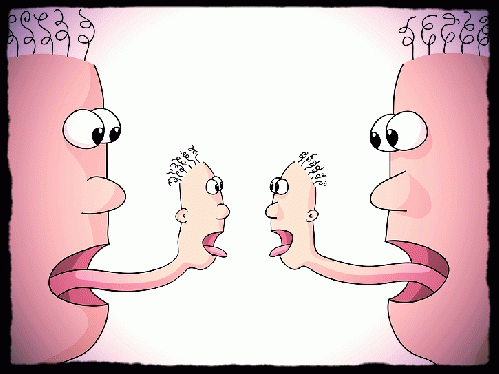/>Stop the yackety yack!
Our mind is often the stage for the acting out of a recurring dialogue between two conflicting parts of our psyche. In people with mental disorders, one of these voices--inner aggression--can take over or "possess" the consciousness of these individuals and command them to commit dangerous or criminal acts. Yet the rest of us have troublesome inner voices, too.
Our voices are more subtle, restrained and rational than in mentally disturbed individuals. Yet these voices or thoughts can still take control of our consciousness, make us jump to their commands and suggestions, and produce suffering and self-defeat.
Our oppressive inner dialogue consists, on one side, of the point of view of inner aggression. This dynamic or drive is seated in our inner critic or superego. On the other side of the conflict, inner passivity (seated in our defensive subordinate ego) functions as an enabler of our inner critic. Classical psychoanalysis has known about this inner conflict, but the universality of the problem, the self-damage it causes, and its mechanisms of operation have never been well communicated to people.
There's a lot of resistance to seeing this inner conflict because it exposes us to be, at this deep level, quite a bit less intelligent than we would like to think. There's "a monkey on our back" when we can't self-regulate successfully, and there's "an ass in our head" when we bicker foolishly with ourselves.
This dialogue proceeds according to a straightforward formula: Inner aggression attacks and inner passivity defends. The superego attacks or belittles us for our slightest mistakes or misdemeanors. Sometimes we're attacked just for what we think--we don't even have to do anything bad or wrong to feel the wrath of the superego. Meanwhile, on the other side of the conflict, our unconscious subordinate ego jumps up reflexively to defend us, even when the accusations from our superego are spurious, cruel, or just plain nonsense. Often our unconscious ego offers up guilt and shame, which is a price we pay in suffering, to placate our relentless, authoritarian superego.
We tend to be unaware of the existence of the conflict. Still, our emotions, beliefs, and sense of self are caught in the middle, shifting back and forth from one side to the other, depending on which point of view is most influencing us at any moment. Sometimes we detect the conflict with varying degrees of awareness; we're likely to be more aware of our inner critic than our inner passivity. Like an enthralled spectator, though, we're usually unable to put a stop to this primitive clash of aggression and passivity.
Two examples of this futile inner dialogue can help us to recognize it and moderate it (if not eliminate it) when it arises in our psyche.
A businessman reported that, when driving to work, he often got into a debate with himself concerning his investments. On his drive, which took him past the branch offices and retail outlets of major companies, he tried to evaluate their state of commercial activity. This brought up self-doubt concerning the wisdom of his investments. An inner dialogue followed along these lines:
Inner aggression : Look at that business and how well it's doing. How come you're not invested in that business!Inner Passivity : Yes, it's appears to be doing well, but I can't be invested in everything.
Inner Aggression : Of course you can't be invested in everything. But you can still be making better decisions! You're losing money on that last investment you made.
Inner Passivity : I haven't lost that much. I'm sure it's going to come back. And, anyway, it was my financial adviser that got me into that mess.
Inner Aggression: You didn't study the market well enough. You should have known what was going to happen. It was a dumb move!
Inner Passivity: I'm going to talk to a fellow I met the other day. He knows a lot about the market.
Inner Aggression : Good, talk to him! Maybe he can smarten you up.
And on it goes. The content of the dialogue is largely irrelevant. The driving force behind it is the compulsion to express or represent either a passive or an aggression viewpoint.
(Note: You can view every article as one long page if you sign up as an Advocate Member, or higher).





